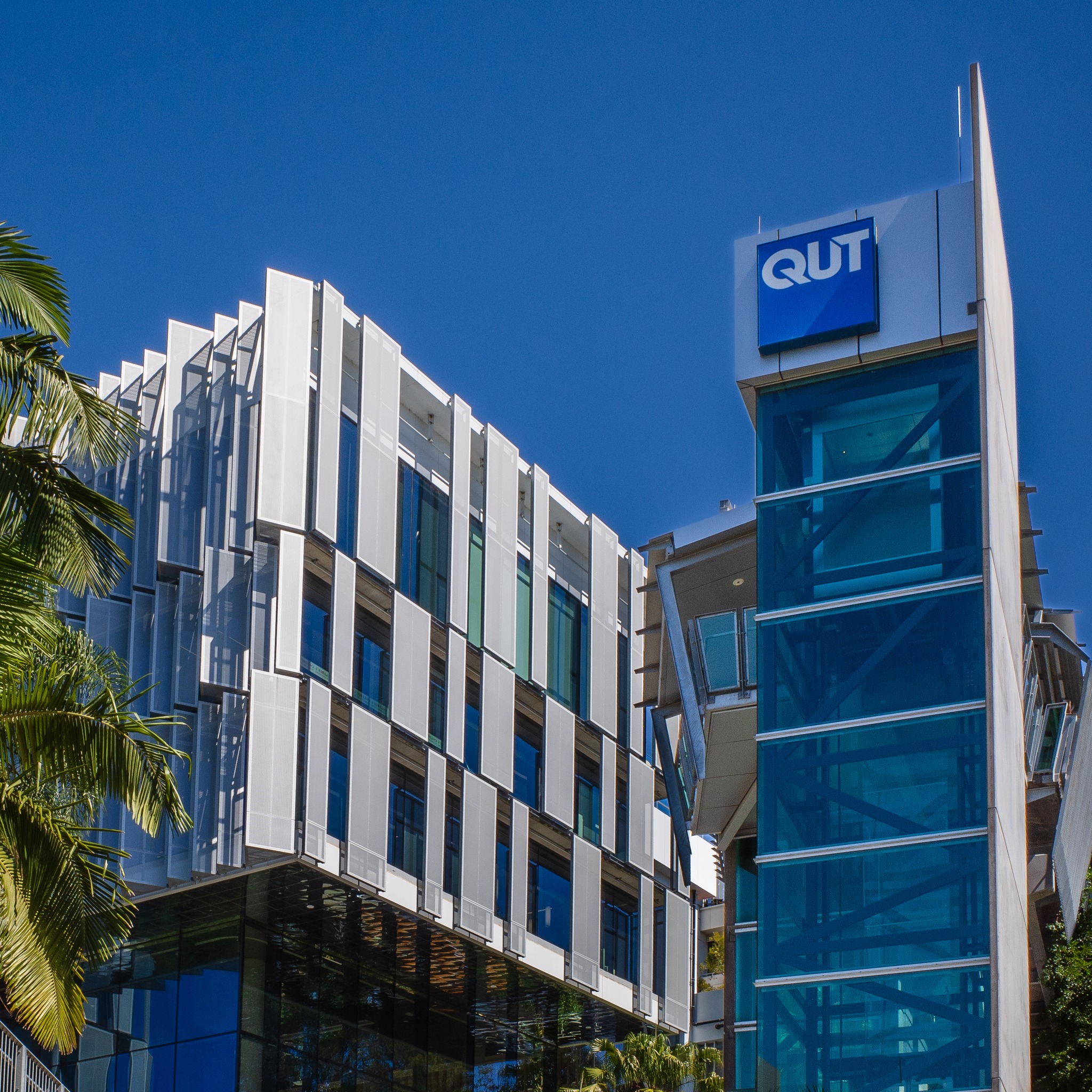GPO Box 2434, Brisbane, QLD 4001, Australia
Career Counselling

Queensland University of Technology (QUT) is a notable institute of higher learning located in Brisbane, Australia. Its close ties with industry experts - both from an academic and research collaboration perspective - have led to its nickname of "the university for the real world". With over 53,000 students, it is a powerhouse of teaching and research.
QUT has two campuses, both in the city of Brisbane. The Gardens Point campus occupies the heart of the city, and houses the Faculties of Engineering, Science, and Business and Law. The vibrant Kelvin Gr...
| Establishment year | 1989 |
| Total Students | 53,253 (2021) |
| International Students | 7,145 (2021) |
| QS World University Rankings 2024 | =189 |
| Campus Size | 72 acres |
| Total Number of Campuses | 2 (Gardens Point, Kelvin Grove) + Executive Education Centre in Canberra |
| University Website | https://www.qut.edu.au/ |
| No. of Schools and Divisions | 5 Faculties (Business and Law, Creative Industries, Education and Social Justice, Engineering, Health, Science) |
| Nobel Prize Winner Alumni | 0 |
| No. of Education Programs | 100+ (undergraduate), 100+ (postgraduate) |
| Student to Faculty ratio | 24.5:1 |
Queensland University of Technology offers undergraduate and postgraduate courses through 5 Faculties, which are further subdivided into 30 Schools.
For undergraduate domestic applicants, the primary factor considered is the Australian Tertiary Admission Rank (ATAR). Every course has an offer guarantee, which means that if a candidate's ATAR is higher than a minimum threshold, that candidate will be offered unconditional admission. Other than that, students must have completed Year 12 or be in the process of completing it, and be at least 16 years of age at the time of commencement of the chosen program.
Certain courses may ask for additional information or mandate extra stages, like portfolios, resumes, auditions, or personal statements.
Postgraduate entry requirements vary widely by course, for both domestic and international students. Most courses require completion of an undergraduate degree before a student joins the PG program, though a few might allow students with diplomas and professional experience. Many courses have a certain minimum GPA (or equivalent) requirement during the undergraduate degree. Course-specific requirements might include referee letters, interviews, CVs, professional training, and portfolios. International applicants for PG courses will need to complete the English proficiency requirements in case their country of origin is not English-speaking; this can be done by submitting IELTS or TOEFL scores.
International undergraduate applicants should check relevant course pages to understand the equivalent minimum levels of performance required in Year 12 examinations in their home country. Any additional requirements for certain courses are the same as for domestic UG applicants, and English proficiency requirements mandate submission of recent TOEFL, IELTS, Cambridge, or Pearson test scores; specific courses may require higher marks in these tests.
The admission process for all postgraduate courses, for both domestic and international applicants, follows these steps:
Undergraduate international students follow a process similar to that outlined above (for postgraduate students). However, there are two different modes of application: directly to the University through the central application portal, or via an authorised QUT representative in the country in which the applicant resides. An application fee of $100 must accompany every submission.
All domestic undergraduate applications must be submitted via the Queensland Tertiary Admissions Centre (QTAC). QTAC also sends acceptance results, which are sent much earlier than international UG results: for example, between October and January for Semester 1, which starts in February.
Undergraduate international students at QUT pay tuition fees that vary by course, but only to a very small extent. For example, the Bachelor of Business Administration course has annual fees of $32,100. The Bachelor of Design (Architecture) course has similar tuition fees of $33,000 per year. The Bachelor of Behavioural Science (Psychology) is priced at $32,800 annually.
Postgraduate international students pay tuition fees that are typically 20% more than undergraduate international fees in the same area of study. For example, the Master of Engineering course has annual tuition fees of $38,700, and at the lower end, the Master of Advanced Practice Nursing charges $31,600.
Postgraduate domestic students pay tuition fees that are a step lower than those of PG international candidates and that are usually in line with UG international fees in the same study area. For example, the Master of Engineering course has domestic tuition fees of $31,300, and the Master of Advanced Practice Nursing program is associated with fees of $22,700 per year.
Undergraduate domestic students have their cost of education heavily subsidized by the Australian Government, through the Commonwealth Supported Place (CSP) scheme. The student contribution fee in CSPs is one of these amounts for all courses: $4,124, $8,301, $11,800, and $15,142.
In addition to tuition fees, the University also charges a Student Services and Amenities Fee, capped at a maximum of $326 for 2023. International applicants must ensure that they purchase Overseas Student Health Cover (OSHC) from an accredited provider.
QUT provides a helpful guide to estimating living costs: according to the University, students should set aside $500 per week for accommodation, food, utilities, transport, and personal activities. This comes to $19,500 for a typical academic year when 9 months are spent on campus. An additional initial amount of $2,500 should also be budgeted to get set up.

Queensland University of Technology has two main campuses in the city of Brisbane. The Gardens Point campus is located in the city centre, and is home to the students of Business, Law, Engineering, and Science. It contains museums, public arts locations, sports and recreational facilities, and the world class Science and Engineering Centre. The Kelvin Grove campus houses the Creative Industries, Health, and Education academic facilities, and is a vibrant location that contains many cafes, restaurants, bars, and a well equipped fitness centre. In addition to the two campuses, the University also has an Executive Education Centre in the city of Canberra. This learning space in Australia's capital city is designed to accommodate up to 40 high powered business leaders who are looking to further build on their professional profiles.
The University encourages its students to engage in sports at all levels: from casual social sports events to the Elite Athlete level. Social sports like basketball and soccer are organised regularly at both campuses, and allow non-regular players to sign up for sporting activities, to stay fit and improve their teamwork and leadership skills. One level up, there are sports clubs that take players from novice to expert levels. Still higher, the University trains and sets up fixtures for high quality athletes to participate in Division 1 and 2 national inter-varsity UniSports. At the highest level, the University is home to over 200 elite Athletes, who are given scholarships and assisted in balancing their sports and academic commitments.

The YMCA Fitness and Aquatic Centre at the Gardens Point campus contains state of the art facilities to help every member of the QUT community stay active. From a 50 metre Olympic Size swimming pool to a cycle centre with 213 racks that encourages physical activity while commuting, to the Exercise Physiology clinic where high performance athletes can choose to level up their skills and heal their injuries, it provides a very wide range of amenities. Over and above the gym, aquatics, and personal trainer facilities, group fitness and onboarding classes are also held to increase the reach of the Fitness Centre.
The QUT Career Directory is a complete online and offline resource that helps students of the University identify the best fit jobs for their skills and interests, assists them in understanding how to identify and apply to companies for part time and graduate job opportunities, and polishes their resume and interview skills. It provides advice and insights, a regularly updated jobs database, qualified career counsellors who guide students on the right paths, resume and CV optimisation services, online and offline interview preparation sessions, and seminars and workshops to spread awareness; some of these can also double as networking events with representatives of potential employers.
QUT offers a very wide range of scholarships: to students with exceptional academic, creative, and sporting achievements; to candidates facing financial difficulties; to Aboriginal and Torres Strait Islander students; to students with business ideas; and to students from remote areas.
The International Merit Scholarship is the most widely awarded grant to international undergraduate and postgraduate students in all Faculties except Health. For those candidates who exceed the minimum academic and English proficiency criteria (these are usually very strict, e.g. for many UG courses, there is an ATAR requirement of 95) for the scholarship, there is a 25% tuition fee reduction in the first two semesters.
The most prestigious academic merit award at QUT is the QUT Excellence Scholarship (Academic). It offers $5,000 per semester towards tuition fees, for a total of up to 6 semesters or three years. This amounts to a total scholarship amount of $30,000. It is available only to undergraduate students, but these can be either domestic or international. The criteria for this scholarship are even stricter than those for the international merit scholarship, with a minimum ATAR of 98.
There are also scholarships for under-represented groups at the University: for example, the Women in Science, Mathematics, and IT Merit Scholarship awards $2,500 per year to undergraduate domestic female students entering the Facility of Science, and this continues as long as the awardees maintain a GPA of at least 5.0 per semester.
